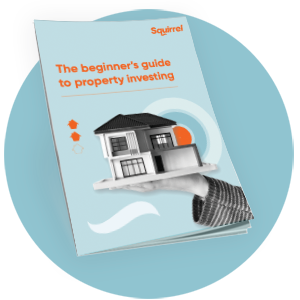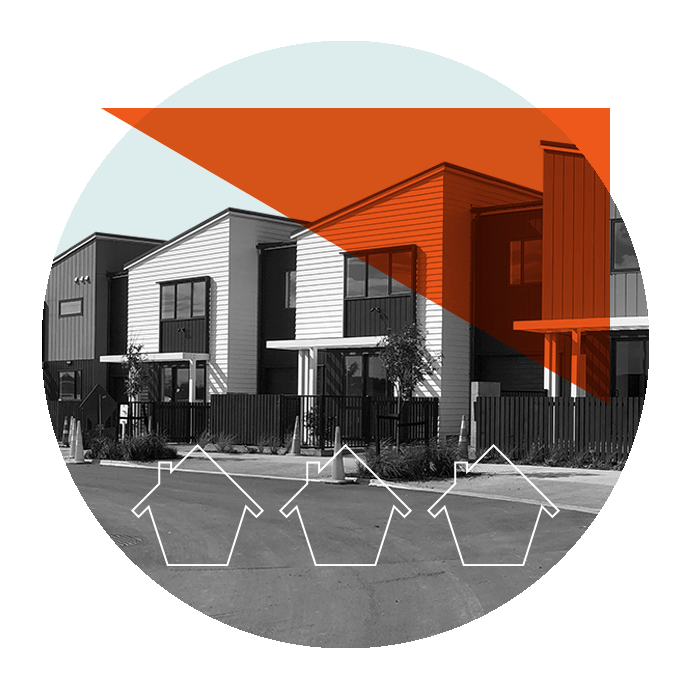Property investing 101 - everything you need to know to get started



It's all in our free guide
Read about the do's and don'ts of investing in property, how to choose what type of property to invest in, managing the financial side of owning multiple properties, and a whole heap more.
Get the guide to investing in property


There's a reason why property is one of the most common forms of investment in New Zealand
For a huge number of New Zealanders – more than 130,000, in fact – owning an investment property is a key part of their wealth creation plans.
Whether it’s a single property bought with the aim of creating a secondary passive income to help in retirement, or a growing portfolio that expands year by year, investing in homes just makes sense to many of us.
Quickly find what you're looking for:
Why invest in property?
Choosing a place to invest
Eligibility for buying property in New Zealand
Tips to grow your portfolio
10 mistakes to avoid in property investing
Common questions
Property investor’s checklist

Why invest in property?
New Zealand needs rental properties. The number of households renting is increasing each year and the bulk of those are living in homes provided by private landlords. This creates plenty of opportunity to use property as a way of building your own wealth.
An investment you can touch
For many investors, the appeal is that, when you’re buying a rental property, it’s an asset that you can see and feel.
If you want to know how your investment is faring, you can pop over and have a look (with adequate warning to the tenant, of course). Because we all understand how a rental property works, it can be easier to relate to investing in a home than in something less tangible such as shares.
Leverage your way to gains
Property investment is one of the few investment vehicles in which you can use other people’s money (in this case, your lender’s) to get to your goals.


Choosing a place to invest
You know you want to be a property investor. But where do you want to invest?
Some people choose to buy investment properties in their own neighbourhoods because they know them well. They know which sorts of properties are popular, understand what tenants are looking for and know the things to watch out for when selecting a place to purchase. Buying an investment near your home can be helpful if you’re planning to manage the property yourself, too.
But other people look further afield, particularly if they are investing in several properties. Diversification gives you broader exposure to the market and you may identify opportunities in areas that are a little further from home.
There are a few things to consider if you’re deciding where you want to buy.
Who will pay the rent?
There are still some parts of the country that have very cheap house prices. While these may look like a great deal, there are some points to ponder before jumping in.
Consider the population of the area. Is it made up of young families, or mostly older people? Is the population noticeably ageing? This can affect the sort of property that people want to rent, how much they can afford to pay and the pipeline of future tenants.
What sort of employment is available locally? People usually want to live near their jobs (or where they are studying). If there is limited employment in the area, that may mean less demand for housing. If there is only one key employer, you may be vulnerable if that business was to decide to move out of town.
How is the local economy faring? We talk about the country as a whole but it’s often a mixed picture between regions. Some might be booming while others struggle. You’ll tend to see the best rental price growth and capital gains in places that have a strong local economy. Understand what drives it before you jump in.
Standard advice is often to look for a place that is near key public transport infrastructure and roads, with good access to local amenities. Being in a convenient location not only makes your property desirable to tenants but pushes up the value.
What does the future look like?
If you know there are key developments planned for an area, you could look to buy before others cotton on to the increasing opportunity. Good examples of this are areas where new roading or public transport connections are planned, or commercial hubs that will attract jobs.
Build new or buy existing?
You’ll also need to decide whether you want to buy a new or existing home. There are benefits and drawbacks to each.
A new home should have very few maintenance issues, at least for the first decade or so. You can also pick exactly what you want and ensure it meets all the required regulations, and you’ll have a warranty from the builder.
The benefit of existing homes, however, is that they tend to be more plentiful in the sought-after central suburbs of cities and towns.
You can also thoroughly check out what you’re buying before you sign the agreement and won’t get caught by any unexpected or expensive delays during the building process.
There is usually more opportunity to add value to existing homes than there is to new builds – you may be able to get an existing place that is a bit rundown at a sharp price and spend a bit of cash on it to significantly improve its value.
Capital gains, or yield?
One of the questions that many new property investors have to grapple with is whether to pursue an investment for its capital gains or yield.
In Southland, where the median purchase price was just under $340,000 in September 2020, the median rent on TradeMe was $340. In Auckland, the median house price was $955,000 and the rent $570. That means the yield on the cheaper house is much higher.
Yield is calculated as the annual income of a property divided by its purchase price.
The catch is that capital gains are usually better on more expensive properties.
Even if all the houses in a city increased in value at the same rate, one that is worth $500,000 will only increase by $50,000 if prices go up 10 per cent, while one that is worth $2 million will gain $200,000. It’s often the case that more expensive areas have stronger value increases, or have less weakness in downturns.
Whatever your strategy, it’s a good idea to think through why it’s appropriate for you and what you hope to achieve.
Generally, cheaper properties have higher yields. That is because the difference in rent between a cheap house and an expensive one is not as great as the difference in purchase price.
Eligibility for buying property in New Zealand
In 2018, the New Zealand Government passed legislation to prevent most overseas buyers from buying real estate in New Zealand. The legislation was designed to slow down foreign capital pouring into an already overheated housing market.
If you’re a New Zealand citizen living overseas, or a permanent resident residing in New Zealand, then the new law doesn’t apply to you and you’re free to buy property. The same is true for Australian and Singaporean citizens who can purchase in New Zealand due to free-trade agreements with both countries.
If you’re overseas and need to borrow money, the property will be deemed an investment property.
That means there will usually be a maximum LVR of 65 per cent, meaning you need a 35 per cent deposit – although this may vary, as the individual banks sometimes set their own LVR thresholds.
Developers can apply for an exemption for their developments that will allow foreigners to buy into these developments.

Mortgage finance for overseas buyers is hard
As far as borrowing goes, banks typically aren’t big fans of foreign-based income. They will only accept PAYE income and from reputable employers in reputable countries. If you’re self-employed or a contractor, then it becomes very difficult to satisfy bank criteria even if you are a New Zealand citizen.
Rents in New Zealand will be too low to demonstrate servicing purely off that income so there will be reliance on offshore income to meet bank criteria.
Banks will shave foreign income by 20 to 40 per cent, and use that figure to calculate servicing whether you can afford your mortgage. In New Zealand, affordability testing will be done using those test rates 2 to 3 per cent above advertised rates – which right now is up near 9 per cent.
On the LVR front, overseas purchasers are deemed higher risk than investors living in New Zealand. Many banks require a minimum 40 per cent deposit for overseas buyers, compared to the current 35 per cent for investors.
Banks will be difficult to arrange finance through, so foreign buyers who are not citizens and that
need to borrow some of the purchase price will need to get funding through non-bank lenders.
This is typically at mortgage rates of 8.5 per cent to 11 per cent.

Getting started
Everyone has to start somewhere, so rather than launching straight into building a 5-storey apartment block complete with underground parking and tennis courts, it’s smarter to start out a bit smaller and closer to home.
Should you sell your house or keep it as a rental when you move?
Making this decision should be based on some goals and a good strategy. Ask yourself honestly: does my house fit the bill? Is it likely to yield good results or go up in value? If the answer is no, then you’re better off selling up and using the money to buy a better investment.
A granny flat under your house can be an easy way into property investment
Home-and-income properties make sense on so many levels, including that they can help you buy in an area you might not otherwise be able to afford. It’s a great idea to look for actual grannies to live in your granny flat.
They tend to value the security of having a family close by, are reliable and quiet and much more tolerant of family noise than other types of tenants. Good old nan.
Make sure you’re buttoned down with the rules about Granny flats
When you’re considering buying or developing a home-and-income property, make sure it’s permitted and consented as such, because different rules apply around separate tenancies.
Any extra utility rooms like kitchens and bathrooms will need to meet the appropriate council requirements and be signed off. Failure to do this often invalidates your insurance and makes the property unacceptable security to a lender. It might feel like you’re adding value and cashflow to a property but if it’s not done right it can reduce the value and appeal of your property, as it won’t meet bank criteria. Banks won’t count two rental streams from one property if it’s not legally recognised as two places of residence on the legal description.
Don’t rely on the market to push the value of your properties up
You need to add value to your properties so you have more equity to borrow against. Home and income properties are popular and perform well in every market as long as they are compliant.
Choose equity over rent
Sacrificing higher rents in the short term can be a hard decision, but it’s much smarter to invest in a lower quality property where you can own more equity. This is the old “location, location, location” thing. Good school zones and proximity to public transport and shops will always perform better than poorly located isolated properties.
Get rid of non-standard properties
These are apartments of less than 45sqm and properties with more than 3 incomes. Get rid of them, even if they’re cheap and give you good rents; banks will typically only lend up to 70% of their value (if that), so they’ll hold you back from borrowing what you need. Same with serviced apartments and student accommodation – these can absorb more of your home’s equity than you realise.
Make sure you have the right tax structure
You’ll want to put as much into your investment property as possible so it’s tax efficient.
One way to do this is to sell your existing home to a Look Through Company or an LTC, which you own. The LTC buys the home at a fair market price and then borrows 100% against it. You then provide a personal guarantee to the lender using your new investment property as additional security. You use the proceeds of the sale to clear the mortgage on your own home and put any extra into your new property. In this way you can move the equity from your old property to the new one.
The benefits of using LTCs to hold investment properties have started to shrink in recent years, however, and it may make more sense from a tax perspective to hold them in a regular company instead. Your Squirrel adviser can put you in touch with a specialised property accountant who can help you work out the best way forward on this.
Keep on top of town planning rules
Town planning rules artificially drive land values, so it’s worth understanding them and keeping up to date. For example, under the current Auckland plan, land that has changed from commercial or residential to mixed-use can significantly change the value of land.
10 mistakes to avoid
- Don’t buy because its cheap.
- Don’t rely on lender-provided reports and disclosure; do your own research and due diligence.
- Don't be pressured into moving too fast. The deal of the century comes around once a week.
- Don’t take interest-only because it’s more affordable. Aim to pay a property off and have a loan strategy.
- Don’t fix on the lowest interest rate if your own household income has potential to change and put you at risk.
- View in person or have a trusted person view if buying remotely and get an external opinion.
- When buying an ex-rental to rent out, ensure you are fully informed of insurance requirements. If it’s compliant, do a toxicology report if it’s an ex-rental. Not knowing is not an excuse in a tenancy tribunal if a neighbour tells your new tenant that drugs were manufactured there.
- Don’t buy and sell too quickly.
- Don’t rely solely on the property market to increase your rental property’s value.
- Don’t jump in without having a considered property investment strategy.

What does your risk management strategy look like?
For example, have you got the money to cover three months’ home loan payments if your property lies empty or the rent is unpaid for a time? It’s a good idea to have a flexi overdraft home loan account for say, $20,000 to cover unforeseen expenses and gaps in income.
What happens if your tenants cannot pay the rent?
For the majority of us, a property manager can be well worth it. They will both increase your capacity to own more and reduce the worry and pressure that can come with owning multiple properties.
Body corps sometimes have a loss of rent included in the insurance as long as you are meeting the inspection requirements and have done credit checks and collected bond, vetted tenants and reference checks up front.
Explore the option of having landlord inspection insurance.
Should you rent to family?
Only if you are going to hold them to the same standard as a tenant. If you make the rent too cheap then IRD may consider you are depriving yourself of income and that discount may be subject to taxation so ensure you are within an acceptable and comparable range of like properties. You can be at the low end, but not $200 a week for a property that could be earning you twice that. Ask yourself: when family don’t or can’t pay, what are your rules?
What happens if you sell a property and the bank keeps all of the sales proceeds?
The bank could be fully entitled to request all proceeds of the sale.
Sometimes investors have many properties, plus their home, funded by multiple loans. Although you’ll attribute a certain loan to a certain property, the bank looks at your lending and security as a whole.
When you sell, any remaining loans you have will also be considered, because the bank wants to ensure you can still afford the loans that you want to keep.
You don’t always have to pay down the loan that relates to the property you’re selling. There may be a loan with a lower break fee, or a way that you can split the settlement proceeds to reduce a few of your loans. Be sure you have a plan on the way in, and on the way out, that’s both understood and supported by your lender.
Ensure you’re educated and informed prior to settlement day of your rental property and that you have engaged with your mortgage adviser, so you’re not hit with any nasty surprises.
What happens when you come off interest-only and the bank forces principal-and-interest payments because your property value has changed?
The banks are subject to a responsible lending code, which means they will have approved your loan for a maximum term of 25 or 30 years.
If, for example, you have a 25-year loan, and you’re on interest only payments for 5 years, you’ll then only have 20 years left to pay the loan principal off – meaning your payments could be substantially higher.
Interest-only is basically renting your money from the bank. If the goal is to have passive income in retirement, then you need to work towards paying the loan off in time – and the most efficient way to get there is a principal-and-interest strategy from day one.
A reduction in value would only matter to the bank if you were to sell the property. It might assess the loans you want to retain and the value of the securities the bank has, coupled with the reserve bank LVR policy of the day.
Interest-only is a strategy for cashflow efficiency, and that’s it.
What if you see the deal of the century and the banks says no?
Firstly, why is the bank saying no?
If it’s down to affordability, then you need to ask yourself whether the bank might be right. Can you really afford it? And does the bank have a clear picture of your income and expenses from all sources?
It might be a no because the bank has concerns about the quality of the property as security for the loan – such as if there have been unconsented works or improvements made. That could be if it has a granny flat with no permit, no firewall for a kitchen, load bearing walls removed – the list is endless.
In that case, you’ll need to understand the insurance risk involved with the issue, and if you still want the property you’ll need extra time from the bank so you can pay to get a COA (certificate of acceptance) from the council and insurance company. That will need to be presented to the bank along with a quote for any and all work needed to get the property compliant.
If it’s a plaster house with potential weathertightness problems, or issues that may mean the property may not be able to be legally tenanted, you may need comprehensive testing to prove to the lender the home is ok. If it needs a re-clad, then full costs and quotes will be required and those will be assessed for affordability as well.
If you’ve weighed up all considerations and you still want the property, but the banks are saying no, then there are non-bank lending solutions that range in price. There’s often a “Yes” out there but it comes at a price – such as higher rates, needing to front a bigger deposit or multiple securities. Still, non-bank options can be a great interim solution until you can get back to main bank lending.
Your mortgage adviser can explain the cost of different options and what’s required of you – and help you get that clear exit plan in place, back to best-priced lending.

Property investor's checklist
- Have you got a strategy? If not, talk to an experienced Mortgage Adviser who can help.
- Start small
- Ditch non-standard properties that can restrict your lending
- Check you’ve got the best tax structure
- Are you all over the latest town planning rules?
- Make improvements to your properties to increase rental yield
- Use multiple lenders
- Get the balance between income and equity
- Don’t fall in love with your investment property
- Invest for the long-term


Do the research now, thank yourself later
We've made it easy by putting our expertise onto paper. Everything you need is in one PDF guide.
Get the guide to property investing





